Research
I am interested in human perception and computer sensing. I believe that a solid understanding of perceptive actions will allow us to design new experiences and access to the world.
2021
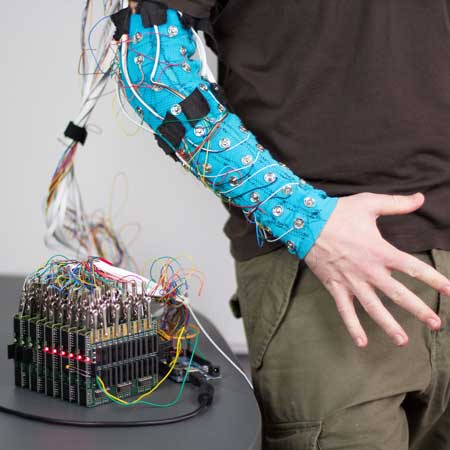
Skill Sleeves: Designing Electrode Garments for Wearability
paperJarrod Knibbe, Rachel Freire, Marion Koelle, and Paul Strohmeier
in Tangible, Embedded, and Embodied Interaction (TEI)
Jarrod and I built a multi-electron sleeve for his research into EMS stimulation. We then invited Rachel Freire to join us in designing an updated version of that sleeve. This paper discusses this process and uses this to discuss the general concept of wearability. It was ages in the making. as Jarrod said "... and all it took was three weeks of writing -- and three years of talking about what to write".
Links: pdf talk Project Page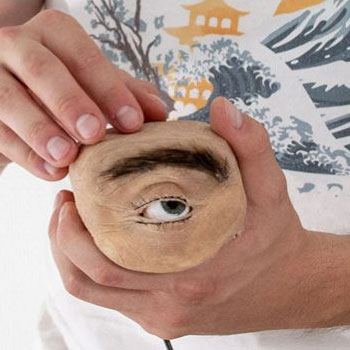
Eyecam: Revealing Relations between Humans and Sensing Devices through an Anthropomorphic Webcam
paperMarc Teyssier, Marion Koelle, Paul Strohmeier, Bruno Fruchard, and Jürgen Steimle
in Human Factors in Computing Systems (CHI '21)
Marc Teyssier built another one of his creepy anthropomorphic objects. This time as a camera. He wanted to use it as commentary on how we design sensing technology. I was involved with the framing and writing of the paper.
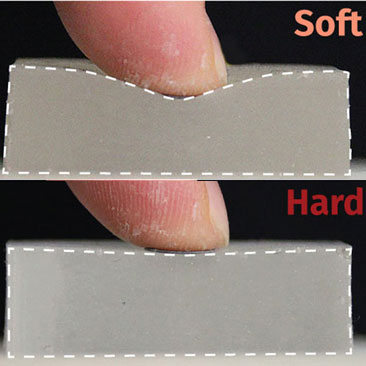
Squish This: Force Input on Soft Surfaces for Visual Targeting Tasks
paperBruno Fruchard, Paul Strohmeier, Roland Bennewitz, and Jürgen Steimle
in Human Factors in Computing Systems (CHI '21)
This project developed from our interest in designing pressure input on the skin. We performed multiple experiments to better understand the overal space of providing pressure input on soft surfaces. One thing we noted is that our study setup generally produced much better results than the literature previously suggested. I advised on study design, and contributed to data analysis, framing and writing of the paper.
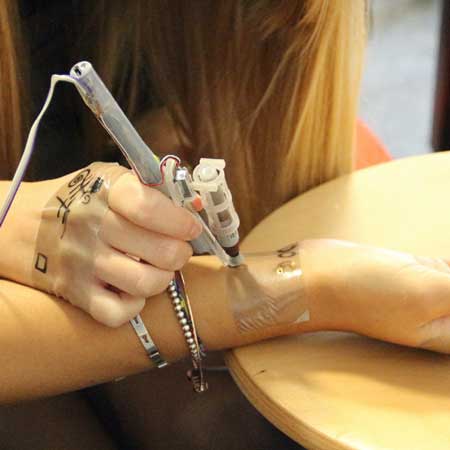
BodyStylus: Freehand On-Skin Design and Fabrication of On-Body Interfaces
paperNarjes Pourjafarian, Marion Koelle, Bruno Fruchard, Sahar Mavali, Konstantin Klamka, Daniel Groeger, Paul Strohmeier, and Jürgen Steimle
in Human Factors in Computing Systems (CHI '21)
Here we present a concept and prototype implementation of concurrent, computer-supported sketching and implementing of epidermal devices. In many ways this was one of the most complex systems I've ever worked on, as the interplay between all the elements from new materials (the gold ink we used and the various substrate options we worked with) to hacked sensing devices (the on-skin Anoto tracking) to mechanical engineering (the modified dual-purpose pen) turned out much more complex than anyone anticipated. My involvement included the evaluation (together with a large chunk of work which we ended up removing from the paper, hopefully to be published inthe future), conceptualization, framing and writing and simply making sure we don't get lost in the details.
2020
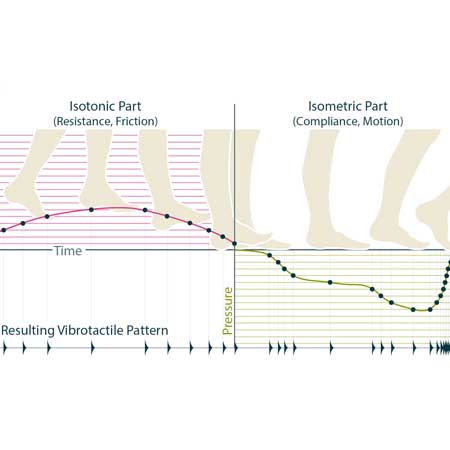
bARefoot: Generating Virtual Materials Using Motion Coupled Vibration in Shoes
paperPaul Strohmeier, Seref Gu¨ngo¨r, Luis Herres, Dennis Gudea, Bruno Fruchard, and Jürgen Steimle.
in User Interface Software and Technology (UIST '20)
This paper essentially implements the hypothetical system described in the 'practical implications' section of my thesis. I had lots of help on the hardware and example applications by some very talented students. Bruno designed the experiments together with me and implemented them. This paper is essentially a logical consequence of my 'Generating Haptic Textures' and 'Mid-Air Haptic Textures' papers.
Links: pdf talk News Report (German)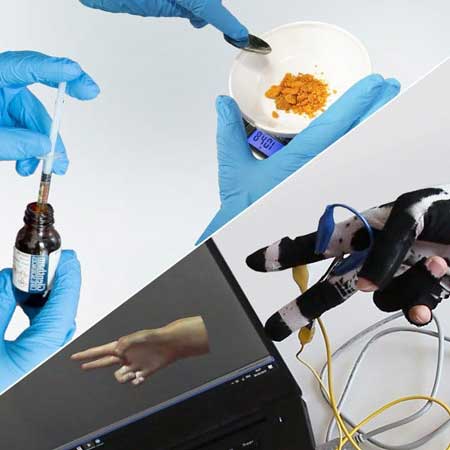
PolySense: Augmenting Textiles with Electrical Functionality Using In-Situ Polymerization
paperCedric Honnet, Hannah Perner-Wilson, Marc Teyssier, Bruno Fruchard, Jürgen Steimle, Ana C. Baptista, and Paul Strohmeier.
in User Interface Software and Technology (UIST '20)
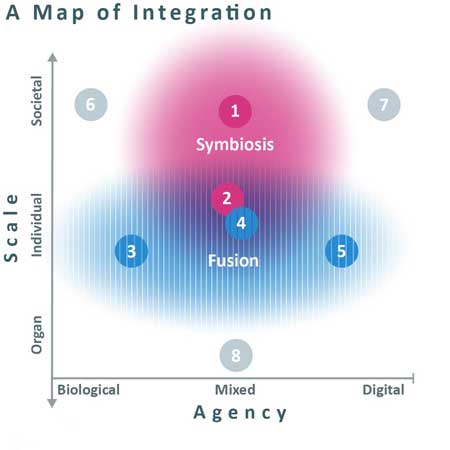
Next Steps for Human-Computer Integration
paperFlorian Floyd Mueller, Pedro Lopes, Paul Strohmeier, Wendy Ju, Caitlyn Seim, Martin Weigel, Suranga Nanayakkara, Marianna Obrist, Zhuying Li, Joseph Delfa, Jun Nishida, Elizabeth M. Gerber, Dag Svanaes, Jonathan Grudin, Stefan Greuter, Kai Kunze, Thomas Erickson, Steven Greenspan, Masahiko Inami, Joe Marshall, Harald Reiterer, Katrin Wolf, Jochen Meyer, Thecla Schiphorst, Dakuo Wang, and Pattie Maes.
in User Interface Software and Technology (UIST '20)
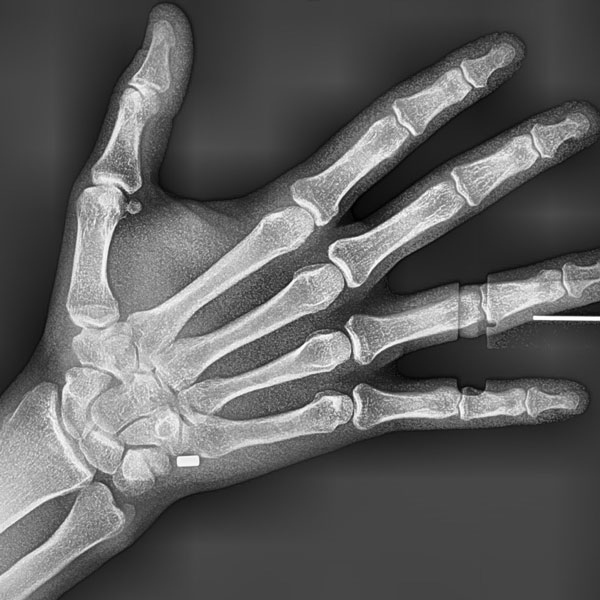
Novel Input and Output Opportunities Using an Implanted Magnet
paperPaul Strohmeier and Jess McIntosh
in Augmented Humans (AHs '20)
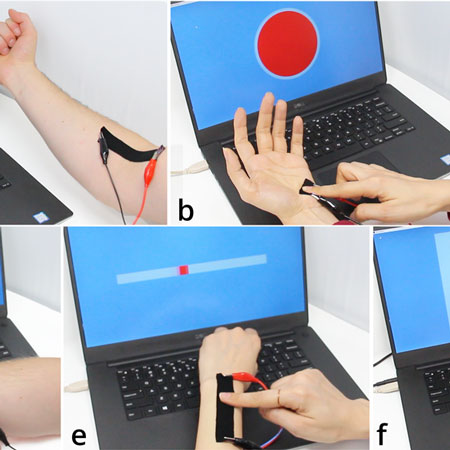
Sketching On-Body Interactions Using Piezo-Resistive Kinesiology Tape
paperPaul Strohmeier, Narjes Pourjafarian, Marion Koelle, Cedric Honnet, Bruno Fruchard, and J¨urgen Steimle
in Augmented Humans (AHs '20)
2019
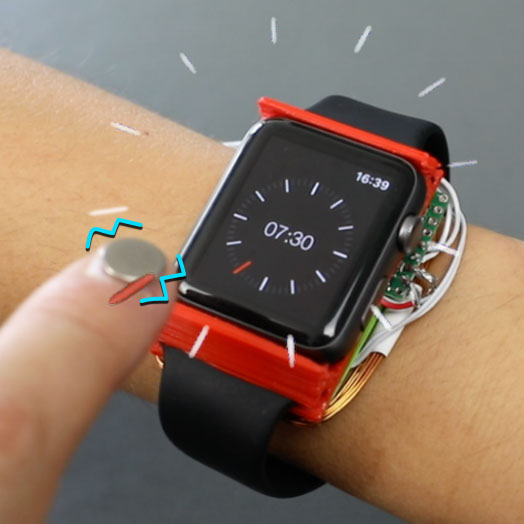
Magnetips: Combining Fingertip Tracking and Haptic Feedback for Around-Device Interaction
paperJess McIntosh, Paul Strohmeier, Jarrod Knibbe, Sebastian Boring, and Kasper Hornbæk
in Human Factors in Computing Systems (CHI'18)
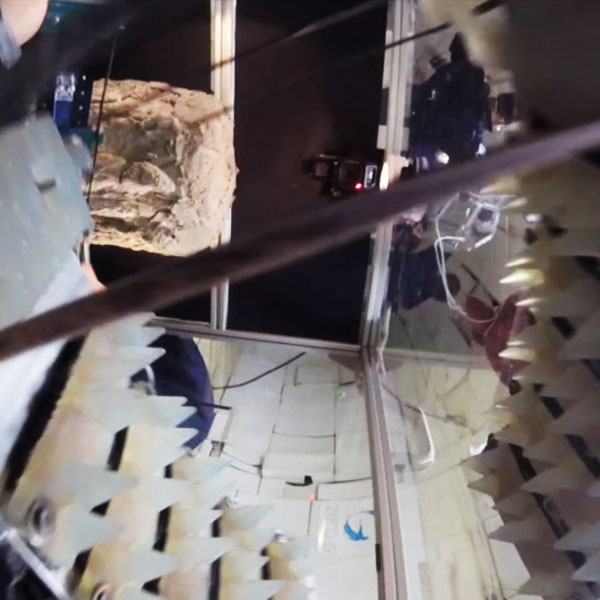
Grappler: Array of bistable elements for pinching net-like infrastructure to low gravity bodies
paperJuliana Cherston, Paul Strohmeier, Joe Paradiso.
in AIAA Scitech 2019 Forum
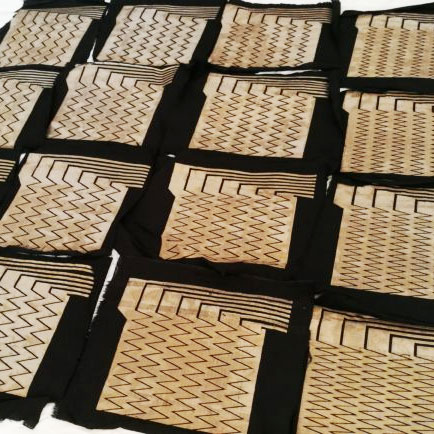
Optimizing Pressure Matrices: Interdigitation and Interpolation Methods for Continuous Position Input
paperPaul Strohmeier, Victor H°akansson, Cedric Honnet, Daniel Ashbrook, and Kasper Hornbæk.
in Tangible, Embedded, and Embodied Interaction (TEI '19)
2018
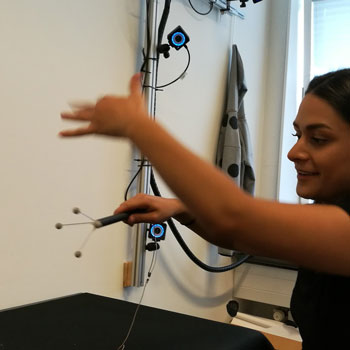
From Pulse Trains to “Coloring with Vibrations”: Motion Mappings for Mid-Air Haptic Textures
paperPaul Strohmeier , Sebastian Boring and Kasper Hornbæk
in Human Factors in Computing Systems (CHI'18)
In this paper we explore rendering textures in 3D space. As our feedback system does not provide the counter-force one experiences when interacting with a surface texture, it is not clear how such mid-air textures might be perceived. We present a qualitative analysis of the experience of interacting with mid-air textures, and how input parameters influence this experience.
Links: pdf video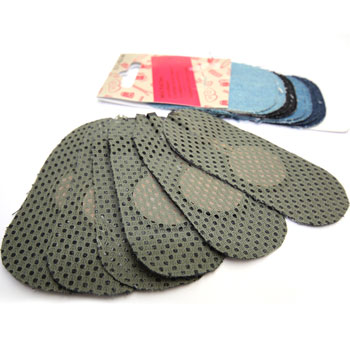
zPatch: Hybrid Resistive/Capacitive eTextile Inputs
paperPaul Strohmeier, Jarrod Knibbe, Sebastian Boring and Kasper Hornbæk
in Tangible, Embedded, and Embodied Interaction (TEI)
Touch input on clothing is difficult as there are ample opportunities for unintentional activation. In this paper we present a simple fabric design that acts as both a resistive and a capacitive sensor. We present instructions on how to build it and we demonstrate that the resulting hybrid sensor is more robust than either resistive- or capacitive-only equivalents and that the additional information improves the detection of custom gestures.
Links: pdf video video: raw data github evaluation data instructables2017
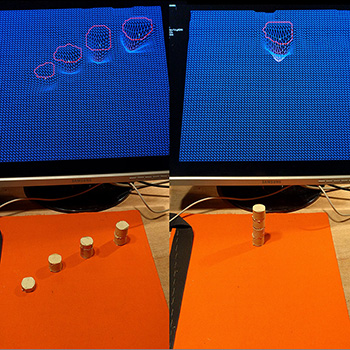
Designing a Multi-Touch eTextile for Music Performances
paperMaurin Donneaud, Cedric Honnet, Paul Strohmeier
in New Instruments for Musical Expression (NIME) 2017
This paper presents a fabric multi-touch sensor that is used as an audio-controller. The sensor was designed by Maurin Donneaud with assistance by Cedric Honnet on the embedded software development. I conducted the evaluation with Cedric and did the analysis as well as the paper write-up.
Links: pdf video web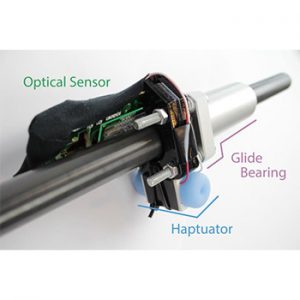
Generating Haptic Textures with a Vibrotactile Actuator
paperPaul Strohmeier, Kasper Hornbæk
in Human Factors in Computing Systems (CHI) 2017
When we move our finger over a material, the structure of the fingertip and the structure of the material interact – they generate vibration. These vibrations are experienced as textures. In this paper we explore how properties of such vibrations map to experiences of texture.
Links: pdf video raw data Best Paper – Honourable Mention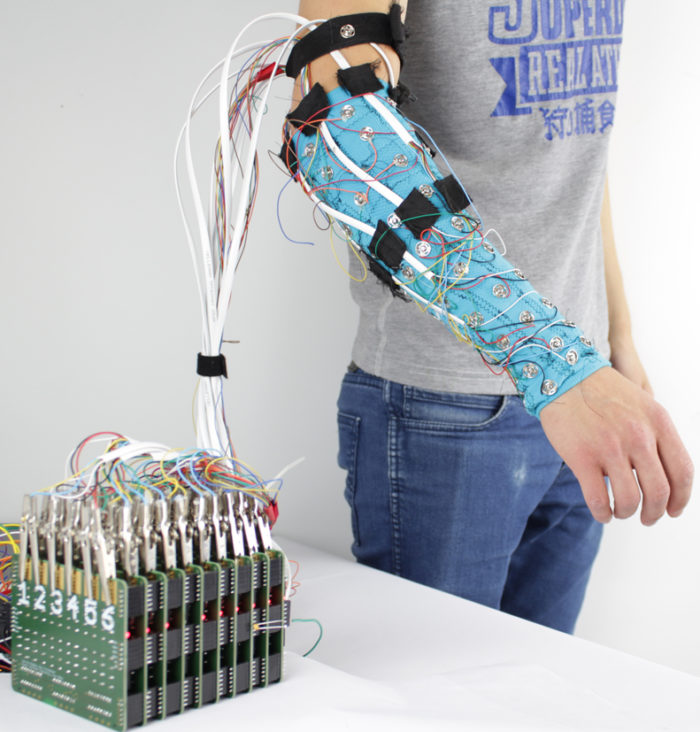
Automatic Calibration of High Density Electric Muscle Stimulation
paperJarrod Knibbe, Paul Strohmeier, Sebastian Boring and Kasper Hornbæk
in Interactive, Mobile, Wearable and Ubiquitous Technologies (IMWUT)
Using methods presented in this paper we could in the future record the skilled movement of an expert musician and play them back using the hands and fingers of a novice. I assisted in designing the electronics and implemented the circuitry.
Links: pdfSpecial Topic: Taking Action in a Changing World.
commentaryAnn Light, Chris Frauenberger, Jennifer Preece, Paul Strohmeier, and Maria Angela Ferrario (2017)
in ACM Interactions Magazine
Casey Fiesler, Lisa Anthony, Paul Strohmeier, Susan Fussell, Gloria Mark
commentaryTaking Action in a Changing World: Research and Community
in Extended Abstracts on Human Factors in Computing Systems (CHI EA)
Second Skin: An Exploration of eTextile Stretch Circuits on the Body
interactive artRachel Freire, Cedric Honnet, Paul Strohmeier
in Tangible, Embedded and Embodied Interaction (TEI)
2016
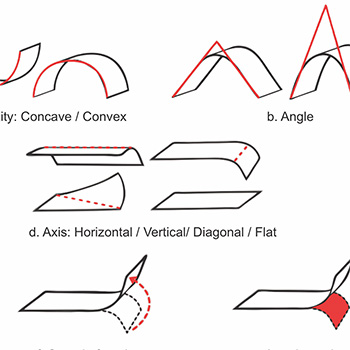
An Evaluation of Shape Changes for Conveying Emotions
paperPaul Strohmeier, Juan Pablo Carrascal, Bernard Cheng, Margaret Meban, Roel Vertegaal
in Human Factors in Computing Systems (CHI)
In a world in which we use shape changing and malleable interfaces, can we use these to subtly express and transmit emotions using shape and shape transitions?
Links: pdf video video: talk + live demo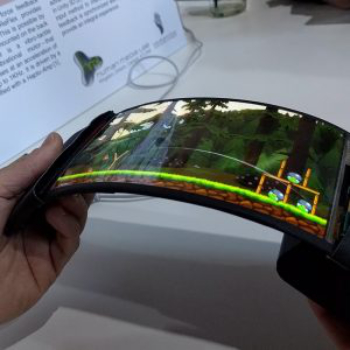
ReFlex: A Flexible Smartphone with Active Haptic Feedback for Bend Input
paperPaul Strohmeier, Jesse Burstyn, JP Carrascal, Vincent Levesque Roel Vertegaal
in International Conference on Tangible, Embedded, and Embodied Interaction (TEI) 2016
We presented the first fully functional, wireless flexible phone. In cooperation with Immersion we augmented the phone with a haptic actuator. This allows us to change how the material properties of the phone are experienced. We conducted studies investigating bend-input mappings to haptic feedback styles.
Links: pdf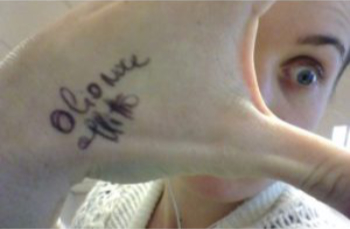
What can Doodles on the Arm teach us about On-Body Interaction?
poster/demoPaul Strohmeier, Juan Pablo Carrascal, Kasper Hornbæk
in Extended Abstracts on Human Factors in Computing Systems (CHI EA)
While on-body interaction is treated as a novel concept in HCI, we point out that it is not necessarily the case. One way in which on-body interaction is quite common is the habit of doodling or writing notes on one’s arm. We presented a survey that explores this practice, in hope that it may serve as inspiration for future HCI explorations.
Links: pdf video
Developing an Ecosystem for Interactive Electronic Implants
poster/demoPaul Strohmeier, Cedric Honnet, Samppa Von Cyborg
in Living Machines – Biomimetic and Biohybrid systems – Springer LNAI Series (LM)
This is a write-up of a little hackathon of Cedric Honnet and myself. We designed and implemented the implant presented in this paper from scratch within 7 days. Samppa von Cyborg supported with process by helping us understand the physical constraints presented by current body-mod methods
Exploring Bodies, Mediation and Points of View using a Robotic Avatar
interactive artPaul Strohmeier
in Tangible, Embedded and Embodied Interaction (TEI)
2015

DisplaySkin: Exploring pose-aware displays on a flexible electrophoretic wristband
paperJesse Burstyn, Paul Strohmeier, Roel Vertegaal
in Tangible, Embedded, and Embodied Interaction (TEI)
Watches became popular because of the fast and intuitive way in which they can be used. Smartwatches typically are more complex, requiring menu navigation or activation gestures. This paper explores a method of adapting a watch face to the users body pose to make interactions with a smartwatch easier.
Links: pdf video talk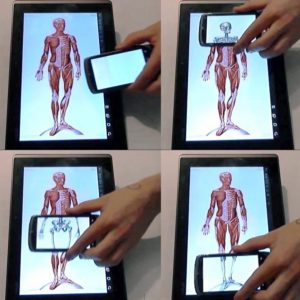
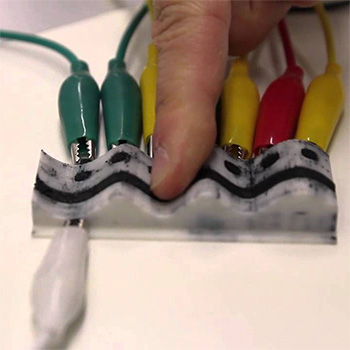
Printput: Resistive and capacitive input widgets for interactive 3D prints
paperJesse Burstyn, Nicholas Fellion, Paul Strohmeier, Roel Vertegaal
in IFIP TC.13 Conference on Human-Computer Interaction (INTERACT)
3d printing is becoming increasingly more useful as a prototyping method. The methods in this paper provide a way to add sensors directly to a 3d print. I contributed sensor designs.
Links: pdf video video: talk + live demo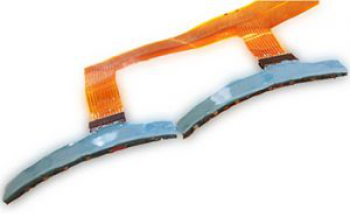
DIY IR sensors for augmenting objects and human skin
poster/demoPaul Strohmeier
in Augmented Human (AH)
I presented various IR based sensors that I had designed over the previous years.
Links: pdf poster Best Poster Award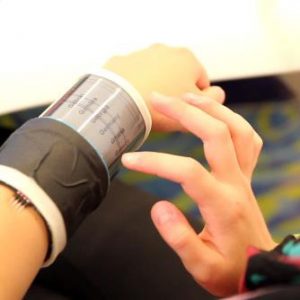
Effects of display sizes on a scrolling task using a cylindrical smartwatch
poster/demoPaul Strohmeier, Jesse Burstyn, Roel Vertegaal
in Human-Computer Interaction with Mobile Devices and Services (MobileHCI)
Using the prototype I built for my master’s thesis, we investigated how different display sizes effected interactions, while keeping the input surface constant.
Links: pdf2014
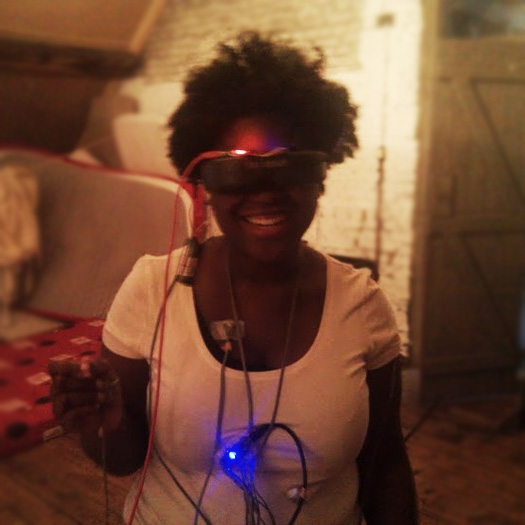
Mediated Touch: Exploring embodied design for remote presence
paperPaul Strohmeier, Ike Kamphof
in International Society for Presence Research (ISPR)
We present an exploration of how people experience communication through a humanoid telerobot
Links: pdf Top Presentation AwardMood fern: exploring shape transformations in reactive environments
interactive artBernard Cheng, Antonio Gomes, Paul Strohmeier, Roel Vertegaal
in Advances in Computer Entertainment Technology (ACE)
2013

PaperTab: an electronic paper computer with multiple large flexible electrophoretic displays
poster/demoAneesh Tarun, Peng Wang, Audrey Girouard, Paul Strohmeier, Derek Reilly, Roel Vertegaal
in Extended Abstracts on Human Factors in Computing Systems (CHI EA)
PaperTab is a multi-device ecology that harnesses strengths of pen-and paper interaction as well as digital systems. I contributed interaction concepts as well as initial sensor designs.
Links: video2012
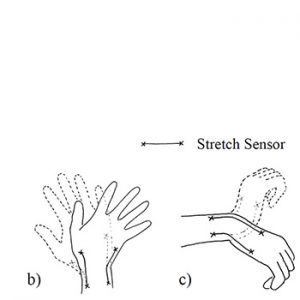
With a flick of the wrist: stretch sensors as lightweight input for mobile devices
paperPaul Strohmeier, Jesse Burstyn, JP Carrascal, Vincent Levesque Roel Vertegaal
in International Conference on Tangible, Embedded, and Embodied Interaction (TEI) 2016
I designed a basic motion-capture method that can be embedded into clothing using stretch sensors.
Links: pdfA Flock of Birds: bringing paper to life
interactive artPaul Strohmeier, Kaja Vembe Swensen, Cameron Lapp, Audrey Girouard, Roel Vertegaal
in Tangible, Embedded and Embodied Interaction (TEI)
2011
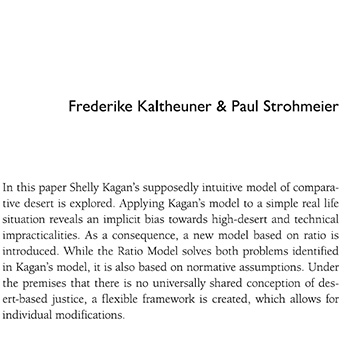
Irrigating Kagan’s Desert
paperFrederike Kaltheuner, Paul Strohmeier
in Maastricht Journal of Liberal Arts
Frederike and I wrote this essay to point out that the model of distributive justice used by Shelley Kagan is based on a set of normative assumptions. It is therefore only ‘intuitive’ to people who share his assumptions. We demonstrate how his model would change if the initial assumptions change.
Links: pdf